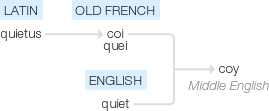Coy
来自Big Physics
Safin(讨论 | 贡献)2022年4月27日 (三) 23:31的版本 (建立内容为“Category:etymology == google == [https://www.google.com.hk/search?q=coy+etymology&newwindow=1&hl=en ref] Middle English: from Old French coi, quei, from Lati…”的新页面)
Middle English: from Old French coi, quei, from Latin quietus (see quiet). The original sense was ‘quiet, still’ (especially in behaviour), later ‘modestly retiring’, and hence (of a woman) ‘affecting to be unresponsive to advances’.
wiktionary
From Middle English coy, from Old French coi, earlier quei(“quiet, still”), from Latin quietus(“resting, at rest”). Doublet of quiet.
Compare decoy.
Abbreviation of company.
etymonline
coy (adj.)
early 14c., "quiet, modest, demure," from Old French coi, earlier quei "quiet, still, placid, gentle," ultimately from Latin quietus "free; calm, resting" (from PIE root *kweie- "to rest, be quiet"). Meaning "shy, bashful" emerged late 14c. Meaning "unwilling to commit" is by 1961. Related: Coyly; coyness.
